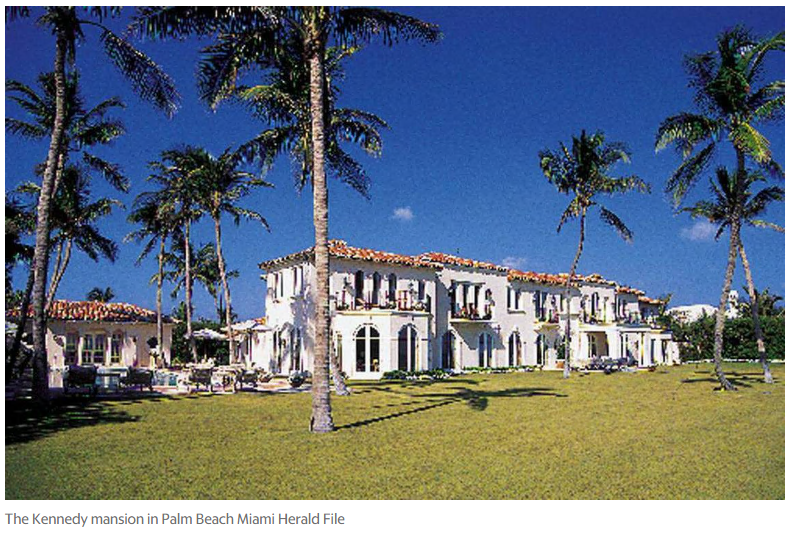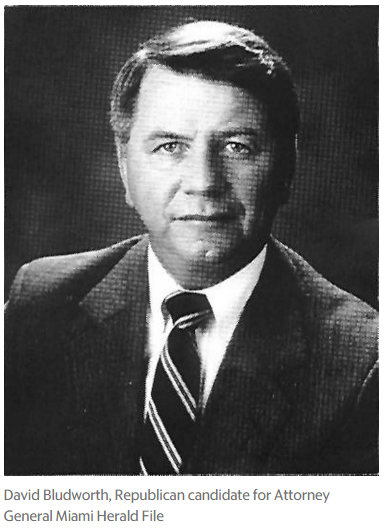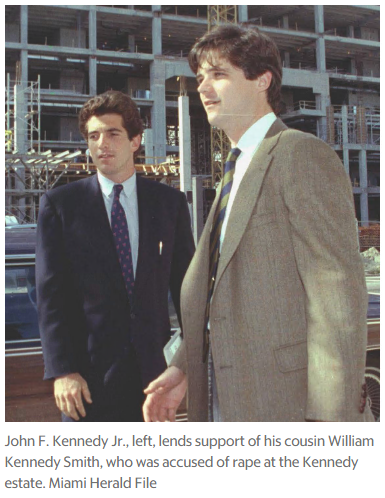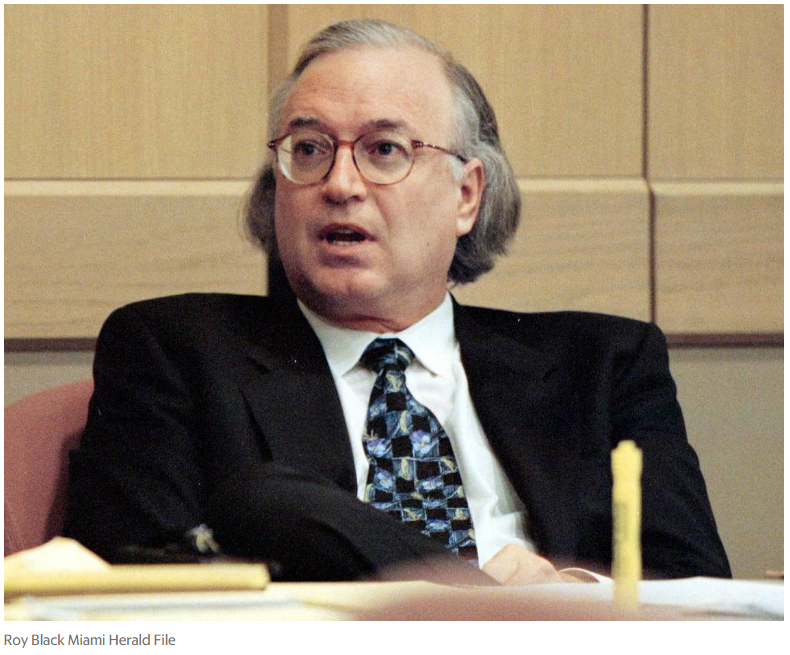The day a Kennedy was accused of rape at the family’s Palm Beach mansion
SOUTH FLORIDA
BY MIAMI HERALD ARCHIVES
APRIL 15, 2019 10:08 AM, UPDATED APRIL 15, 2019 11:06 AM

The Kennedys. Palm Beach. A charge of rape.
It all made for a real-life soap opera in May 1991 that resulted in an arrest, a trial and non-stop cable TV coverage.
Here is a look at the legal saga through the archives of the Miami Herald.
William Kennedy Smith Miami Herald File.
CHARGED
Published May 12, 1991
William Kennedy Smith surrendered to Palm Beach police Saturday on rape and battery charges, then called his accuser’s harrowing account “an outrageous lie” when he faced the media on a dusty path outside the county jail.
Accompanied by his mother and his lawyer, the 30-year-old medical student appeared calm and composed, dressed in a gray suit, pale blue shirt, and necktie. He was alert, solicitous, and composed. “I have read the police report about the events that took place on March 30. The version of events in that report are an outrageous lie, and they represent an attack on me, my family, and the truth,” he said.
Smith, charged Thursday with one felony count of sexual battery and one count of misdemeanor battery, arrived in a rented Lincoln Town Car at the Palm Beach police station shortly before noon, several days earlier than expected.
He was fingerprinted, photographed, and driven to the county jail, where he posted a $10,000 bond with a cashier’s check and was released. He departed from Palm Beach International Airport with his mother, Jean Kennedy Smith, a sister of Sen. Edward Kennedy, D- Mass., for Washington, D.C.
As a jostling crowd of reporters surrounded Smith on his release from jail Saturday, the medical student calmly said: “I am very much looking forward to a trial, where I can testify and where the truth can come out. I have no question that that will happen.”
Smith’s mother stayed by her son’s side whenever she could, entering the jail booking area to wait for him.
“I think it’s unbelievable that someone could personally attack his character, his reputation, and his career. He has dedicated his entire life to helping others,” she said. “I don’t think that anyone who knows Willie would believe her story.”
Smith again refused to give his account of events surrounding his March 30 encounter with a 29-year-old woman at a Palm Beach nightclub and later at the Kennedy mansion. Nor has he spoken to police about it.
In an affidavit released when Smith was charged, police quoted the woman as saying he grabbed her roughly on the leg, bruising her after she declined an ocean swim sometime after 3 a.m. She said she fled but Smith caught up and tackled her near the family pool. He pinned her down, raped her, and said, “Stop it, bitch,” when she tried to push him away, the woman told police.
Saturday, Smith said only, “I did not commit an offense of any kind. I am confident that that will come out.”
Smith has neither confirmed nor denied having sex with the woman. An arraignment was scheduled for June 14 in Palm Beach County Circuit Court, but Smith need not be present at the hearing.
A person with no criminal record would face a sentence ranging from probation to 4 1/2 years in prison if convicted of sexual battery and assault. Smith has no criminal record in Florida or the New York and Washington areas, The New York Times reported Saturday, although his New York driver license was suspended four weeks ago for failing to pay a seven-month-old traffic fine from Washington, D.C. On April 9, Smith paid $100 for the ticket, failure to yield when turning right on a red light, the paper said.

‘SET UP’
Published May 15, 1991
Patrick Kennedy called the woman in the Kennedy estate rape case a Fatal Attraction character and told investigators under oath that his cousin, William Kennedy Smith, said after the episode that he thought he was being “set up.”
Kennedy’s account came from 1,500 pages of witness statements and reports that police released Tuesday.
“In my view this was a person like I said, sort of a Fatal Attraction you couldn’t get rid of and was saying all sorts of wild things and that is the way he had conveyed it to me,” said Kennedy, 24, a Rhode Island legislator and son of Sen. Edward M. Kennedy, D-Mass.
In Fatal Attraction, an obsessive character played by Glenn Close refuses to end a torrid affair after her lover wants to break it off. In the film, there was no rape. Smith is charged with the rape of a 29-year-old Jupiter woman March 30 on the lawn of the Kennedy estate in Palm Beach.
Patrick Kennedy remembered Smith telling him before dawn that day, ‘God, I wish I had gone to bed earlier and this girl is, you know, really whacked out.’ “ Smith also told his cousin that he had sex with the woman and did not use a condom. The next day, Kennedy said, Smith told him, “This is really a setup, isn’t it?’ “
Patrick Kennedy, explaining why he did not talk to police before he left town, said the whole thing was “surreal.” When he found out that someone had taken an urn and a framed photograph out of the house that night, Kennedy said, “I thought, bingo, it is probably Willie’s whacked-out friend.”
The massive batch of documents released Tuesday also contained contradictory accounts. According to Anne Mercer, a friend of the alleged victim, the woman told Mercer “she’d been raped twice,” once on the beach and once inside the estate. “And then she said the first time that Sen. Kennedy was watching,” said Mercer, who picked up the woman at the compound that morning.
Mercer said the woman was hysterical. But the woman told police she was raped once. Asked about Mercer’s account, the alleged victim said, “I don’t know what happened after I called (Mercer).”

Mercer also told State Attorney David Bludworth that she saw no bruises on the woman, even when she changed into one of Mercer’s T-shirts afterward. “Did you see any . . . physical bruises on her or scratches or anything?” Bludworth asked. “No,” Mercer said.
Later that day, police noted the alleged victim had “indications of bruising” on her leg, shoulders and arms. The alleged victim told investigators about her childhood, saying her biological father had beaten her and emotionally abused her. She said she has been having counseling to deal with the abuse and with the premature birth of her baby. Her problems, she said, made her an unlikely candidate for casual sex with a near stranger. “I don’t trust men . . . ,” she said. “And I also can’t afford to get pregnant now. I can’t afford to get a sexual disease because I’m all my daughter has . . . I would not go out looking, as they say.” “I just went out to have a nice dinner with my friends. . . . It was nice to get away from my mommy role.”
In five separate statements to police and prosecutors, the Jupiter woman, often in tears, described the incident in detail. The woman said she had at least four or five drinks that night, after taking a sedative, Carisoprodol, for back pain at 8 o’clock. The muscle relaxant can impair a person’s mental faculties, especially if mixed with alcohol. She drank two glasses of wine and later split a bottle of chianti with Mercer and her boyfriend Chuck Desiderio during dinner.
At Au Bar, she split a bottle of champagne with friends. The woman told investigators she removed her pantyhose sometime after leaving the bar, but she could not recall when.
When Smith took off his clothes to go swimming, she decided not to join him. She gave several reasons why: the water was cold, she hardly knew him, she couldn’t swim, she hadn’t regained her figure after having a baby two years earlier.
Attorneys for Smith criticized the release of the documents, saying they didn’t contain the bulk of evidence that could help clear their client. If convicted, Smith could face probation to a 4 1/2-year prison term. Among the documents released was a statement from an “eyewitness” — Patrick Barry, son of former FBI agent and longtime Kennedy family friend William Barry. He said he looked out a window in the seaside estate early March 30 and saw “two shapes or a shape or something” on the lawn near the swimming pool.
Prosecutor Moira Lasch asked Patrick Barry, “When you saw that shape, did it look like they were lying next to each other or were they on top of each other or sitting up? What do you mean by shape?” Barry replied, “I couldn’t really tell what they — just looked like two people either lying next to each other or, you know, one on top of the other, I couldn’t tell, because it was pretty dark.”
He added that he only looked at the “shape” for about 10 seconds before going back to bed. He said he didn’t hear any screaming. The accuser said she screamed both during the alleged attack near the swimming pool and inside the house afterward, and wondered why the senator and others didn’t rescue her. In his sworn statement to investigators, Sen. Kennedy said he persuaded his son, Patrick, and nephew, Smith, to get dressed at midnight March 29 and go out “for a couple of beers.”
At Au Bar, all three met the Jupiter woman, among others. The senator told police that he was told on Easter Sunday they were investigating “a serious offense” involving his nephew but was not told then of the rape charge.
That evening, Smith called the senator. “You know, there’s some allegations against me,” Smith told his uncle. “And I said, ‘I have heard that.’ And I said — he said, ‘Do you want the whole story?’ I said I think I said, ‘You better tell the whole story to someone, to Marvin Rosen.’ And he said, ‘Fine, I will.’ And that’s the total extent that I have talked to him before or at any time about the incident.”
Detectives noted, though, that telephone records from the Kennedy estate showed that the senator had called Miami attorney Marvin Rosen hours after the alleged rape. Rosen is a partner in Greenberg, Traurig, Hoffman, Lipoff, Rosen & Quentel, the firm that is now representing Smith.
Sen. Kennedy told police he called Rosen Saturday simply to wish him a happy Passover. By Sunday, the senator said, he had become concerned enough about police inquiries to hire Rosen to find out about the urn and photograph taken from the estate.
Smith’s attorney Mark Schnapp said the police documents confirm his earlier charge that authorities are giving a one-sided account of the incident and harming Smith’s right to a fair trial.
“We provided them with a list of names of defense witnesses to be interviewed, maybe six or more . . . and those statements are not in the package,” Schnapp said. “If they haven’t interviewed those witnesses, that’s seriously disturbing. If they have interviewed them, the fact that those statements are not included raises serious questions.”
“I don’t know whether all the statements have been transcribed or not or if they just can’t be released,” said Palm Beach police Sgt. William Atkinson. “If some statements aren’t in there, there’s a reason why they’re not being released.”
David Roth, the Jupiter woman’s attorney, declined to comment. Palm Beach County State Attorney David Bludworth could not be reached.

THE TRIAL
Published Dec. 8, 1991
The prosecution rested its case Saturday in the William Kennedy Smith rape trial, and the defense called its first witness: a congenial lounge lizard with no socks and his shirt unbuttoned halfway down his chest.
Tony Liott, 49, a bartender on the Palm Beach scene for years, contradicted the story of Smith’s accuser. Liott testified he met the woman at Palm Beach restaurant Ta-Boo at 12:30 a.m. March 30. She testified Thursday that she didn’t recall meeting Liott, a longtime friend. She said she entered Au Bar at midnight and stayed until leaving with Smith at 3 a.m.
Liott, entertaining even stern-faced Judge Mary Lupo with his humor and candor, said he and the woman talked for about 20 minutes before she left in her Mazda RX7.
“I got the impression she was going to Au Bar,” Liott said.
His testimony came after the judge refused to let the prosecution introduce a date rape expert. The expert was prepared to testify on rape trauma syndrome, a theory that after a rape, victims often have memory gaps.
The judge disallowed the testimony because it could have delayed the trial until Christmas. The defense insisted it would need time to prepare.
Prosecutors didn’t tell the defense about psychologist Dean Kilpatrick of Maryland until five days before the trial started. Lupo said the prosecution could ask again to present Kilpatrick as a rebuttal witness later if the defense puts on similar testimony.
Without comment, Lupo also dismissed a perfunctory defense motion for a directed acquittal when the state rested at 1:50 p.m. Smith’s lawyers then called their first five witnesses, among them Dr. Henry C. Lee, state crime lab chief in Connecticut. Lee testified that he conducted experiments at the Kennedy estate to test the woman’s story.
He said he brushed a handkerchief across grass and the top step of the concrete stairway, where the woman said Smith grabbed her ankle and she slipped. An “abrasion” was left on the cloth from the concrete, he said. For a second experiment, Lee said he asked defense attorney Mark Seiden to kneel on the Kennedy estate.
The result: The pant knees had a grass stain. Lee drew no conclusions Saturday, but the jurors already have heard that the woman’s dress had no rips, tears or stains.
Prosecutor Moira Lasch will cross-examine Lee in an unusual Sunday afternoon session. The jury voted to hear five hours of testimony Sunday. The defense expects it will take three or four more to present its case.
With the first defense witnesses, Lasch went on the attack for the first time. Her demeanor contrasted sharply with her previous presentation during the 6-day-old trial. In a dull, sometimes flat monotone, she had questioned 23 witnesses, including the accuser, two doctors who examined the woman, Anne Mercer, and experts on hair, grass, soil, semen, and clothing.
She decided not to call four potentially explosive witnesses: the mother of the woman, her stepfather, the father of her 2-year-old daughter, and Denny Abbott, a rape counselor.
“She did a good job with the critical accusing witness, which is going to make or break the case,” said noted defense attorney F. Lee Bailey. “But she made a disastrous mistake in calling Senator Kennedy. She couldn’t handle him once he got on.”
Paul Rothstein, a Georgetown University law professor, said Lasch was excellent on preparation, terrible on presentation.
“She is not aware apparently that it’s necessary to tell the story dramatically and forcefully and to not bore the jury to death,” Rothstein said Saturday.
With bartender Liott on the stand, Lasch accepted his account of the Ta-Boo encounter. Quickly, she established that Liott and the accuser had a 10-year platonic friendship, the accuser didn’t appear to be drunk that night and their meeting wasn’t a date, and “had nothing to do with drugs.”
As he sat on the witness chair in courtroom 411 in West Palm Beach, the bartender’s first words were, “I got fired last night.”
Until Saturday, he worked at The Colony Hotel, a media hangout for the trial. Apparently, he and a new manager had differences. He described the accusing woman as a “nice individual . . . shy,” someone who didn’t go out much. Certainly, he said, she didn’t frequent “hit-on” or pick-up bars.
Early March 30, he said they talked about meeting later at Au Bar.
“It wasn’t a date, no,” Liott said. But he didn’t go. Too noisy, he said.
After a bench conference, apparently prompted by Lasch’s questions about drugs and the past relationship between the woman and Liott, defense lawyer Roy Black re-examined Liott. Did she show a romantic interest in you at one time? “Maybe it could have gone somewhere, but it never did,” Liott replied. She never asked you about cocaine that night? “No.” Nothing about supplying cocaine? “No.”
Defense witness No. 2, Kendall architect Charles M. Sieger, testified that he examined the Kennedy estate for acoustical properties, calling it a “fairly loud house. . . . Noises would tend to travel very far within the house.” The accuser said last week she screamed that night as she struggled about 15 to 20 feet from the house. None of the dozen people at the house said they heard her.
Sieger said recently he heard a conversation on the beach from a second-floor room at the estate. The compound has no air conditioning nor ceiling fans.
Lasch renewed her aggressive cross-examination: You could hear a conversation on the beach over the ocean? Over waves crashing? “Yes.” Sieger acknowledged that no judge had recognized him as an expert on acoustical properties, he took no technical tests at the site and did not research on the house’s history.
“You are not aware that this was known as the Winter White House of the Kennedys?” asked Lasch. “I was fairly young in the ‘60s,” said the 45-year-old witness, who was paid $6,000 for his expertise. “I didn’t pay attention.” Soon after, photographer Edward Yanowitz testified that the Smith defense paid him nearly $8,000 — including about $4,000 for enlargements.
Earlier Saturday morning, before the defense took over, Lasch called the personal physician of the woman. Dr. Barry Lotman, an orthopedic surgeon in Jupiter, said the woman had tenderness in her chest, pubic bone, rib cage and hip six days after the episode. He said she told him that the pain had worsened in the days afterward. “It hurt her to take a deep breath,” he said.
He described her as distraught and nervous. The anxiety, he said, caused a slight tremor in her right arm, “almost like a palsy.” The woman told him she had been raped and asked him about the possibility of infection with the AIDS virus, he said. She later tested negative for the virus. Defense attorney Mark Seiden suggested that the woman’s complaints paralleled earlier complaints she made after breaking her neck in a car accident in 1974.
Lotman treated the woman in late 1990 for her persistent back pain. Seiden also asked Lotman about the woman’s mobility despite her back pain. Could she kick, bite, scratch, scrape, punch, use her knee in someone’s groin, scream, run? Seiden asked.
“Yes,” the doctor said.

QUICK ACQUITTAL
Published Dec. 12, 2991
After 77 minutes of deliberation, six jurors Wednesday found William Kennedy Smith innocent of rape. Smith, 31, broke into a broad grin and jumped to his feet to hug attorney Roy Black.
Twenty minutes later, still smiling, the ex-defendant addressed 41 TV cameras, some 200 reporters, and a legion of cheering supporters just outside the West Palm Beach courthouse: “I want to thank the jurors,” Smith said. “My life was in their hands.”
Smith, the nephew of Sen. Edward Kennedy, also thanked his family for its support. His mother, brother, and two sisters stood by his side. “I’m so happy,” said his mother, Jean Kennedy Smith, as she left Courtroom 411. “I’m so relieved.”
After the verdict, Smith’s seven-member legal team and the family assembled in room 417, closed the door, and whooped in joy.
Near midnight Wednesday, Black and several members of the defense team celebrated over beers at Bradley’s, a Palm Beach bar about two miles from the Kennedy estate.
“We’re very happy tonight,” Black said, nursing a light beer. “We were better prepared than they were,” he said. “They were trying to catch up to us at the end.”
Black said Smith became more self-assured during the 16 days of jury selection.
“He was very nervous when we started out. I tried to loosen him up, and he did wonderfully at the end.” Black said he was worried about prosecutor Moira Lasch “up until the last day of the case. You never underestimate Moira Lasch.”
He called the accuser’s testimony “outstanding. It was the best job of preparation I have ever seen.”
Smith’s accuser, a 30-year-old single mother from north Palm Beach County, watched closing arguments on television and remained in seclusion late Wednesday. She issued a statement: “Despite the enormous personal price, I do not for one moment regret the course of action I have pursued,” she said. “. . . All that I have endured is worth it if I can make it easier for one woman to make for me what was the only choice I could so that I can look myself in the mirror and more importantly my 2-year-old daughter as she grows up.”
Her mother and stepfather attended Wednesday’s closing arguments but left prior to the verdict. Prosecutor Lasch left the court without comment.
The woman’s account of rape more than eight months ago set off a storm of publicity solely due to one indisputable fact: She accused a Kennedy.
It became America’s most publicized rape trial, televised live to millions by Cable News Network and Courtroom Television Network.
Every day in Palm Beach County alone, hundreds called radio talk shows to give their opinions and verdicts. After 10 consecutive and grueling days of testimony from 46 witnesses, the jury began deliberations at 3:33 p.m. At 4:50 p.m., it had a verdict.
As court clerk Debbie Allen read the jury’s not-guilty verdicts for sexual battery and battery at 5:14 p.m., two jurors cried. Juror Lea Haller, 37, wept openly as she looked at Smith. Court reporter Barry Crane beamed. As the six were excused, Smith nodded at them, whispering, “Thank you.” Under tight security, sheriffs’ deputies whisked the jurors away.
Legal experts said the fast verdict meant that the state failed its burden of proving Smith guilty beyond a reasonable doubt. They said the four women and two men probably made up their minds before deliberations even began.
Smith won the case for himself, several experts said. “His testimony and the state’s cross-examination of him was the prosecution’s Waterloo,” said Miami defense attorney Rebekah Poston. But others said the trial may have been decided even before the jurors were sworn in.
Without comment, Judge Mary Lupo ruled inadmissible the statements of three woman — all of whom say Smith sexually attacked them several years ago. The judge also ruled inadmissible the sexual history and past drug use of the woman.
Haller, the weeping juror, said she had read about the statements before she was sworn in, but disregarded them. “To me, that’s just gossip because it was not submitted.”
During closing arguments Wednesday, defense lawyer Black hammered away at the legal doctrine of reasonable doubt. And he appealed to the panel to ignore the Kennedy name and treat Smith like any other defendant.
“The inference here is you have to find him guilty. Otherwise, people will say he’s a member of the Kennedy family and that’s why he got off,” Black said. Prosecutor Lasch called Black’s Kennedy-family argument “specious.” She said the outcome should hinge on one factor: The woman’s story was more credible than Smith’s.
The alleged victim “came forward to tell the truth,” Lasch said in her 90-minute presentation. “The law in the state of Florida gives women the right to say no. (The woman) said no.”
As the lawyers delivered their forceful final statements, seven people sat in the front row, all relatives of principals in the trial. Among them: the woman’s mother and stepfather, Smith’s mother, Jean, and sister Amanda. There was also a man in a white clerical collar — Jesuit seminarian Charles O’Byrne, a family friend. He sat directly behind Smith. He attended Mass with Smith and his mother prior to the 8:30 a.m. court session.
Countering the woman’s rape story, Smith testified Tuesday that they had consensual sex twice. She became furious when he called her the wrong name and then accused him of rape, he said. Lasch, 40, standing at a podium five feet from the jurors, argued that the woman “may not have been a strong individual on March 30, 1991. But she has demonstrated incredibly moral fortitude in coming forward.” “You saw her, you met her,” the prosecutor said. “. . . There was no indication whatsoever that (she) showed any mental problems.”
That night, Lasch said, the woman rejected Smith. That’s when he tackled her, pinned her to the ground, pushed her panties aside, and raped her, she said. “She wasn’t wearing shoulder pads. This wasn’t a football game. . . . She was taken down from behind.”
She belittled Smith’s story. If the two had consensual sex, and the woman’s panties were removed, why was sperm found on the underwear? she asked. If Sen. Kennedy said that he, Smith, and son Patrick left for Palm Beach nightspot Au Bar at midnight, why were Smith and Patrick Kennedy at a second bar until at least 1:15 a.m.? And why would the woman want to have sex with Smith after meeting him for only an hour in a crowded bar?
“This isn’t date rape,” Lasch said. “This is stranger rape.”
After Lasch finished, and the jurors filed out, her husband Alan hugged her and kissed the top of her head. Lasch, legendary for her steely stare in courtrooms, appeared to wipe away a tear.
Black, 46, angrily rebutted Lasch’s arguments. Could it be true, he said, that Smith “tackled that woman who was screaming at the top of her lungs, under a full moon, on an open lawn, and raped her under the bedroom window of his mother?” “Is it preposterous for a man and a woman to get together after a couple of hours and have sex?”
And what about the semen stains on the woman’s panties? After sex, couldn’t semen drip onto the underwear if the woman walked around?
The woman, Black said, was angry and upset because Smith had treated her rudely. And after she cried rape and told police, “there was no turning back.”
